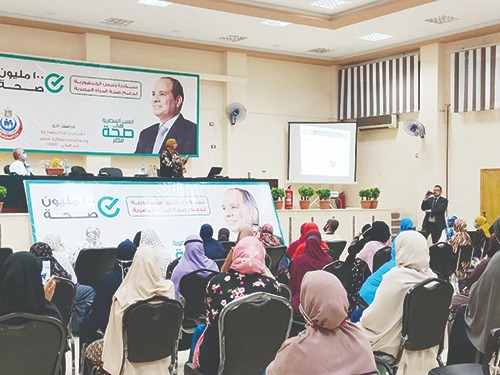The health sector has been receiving increasing attention from President Abdel Fattah El Sisi.
This attention has opened the door for the launch of unprecedented initiatives, such as the Egyptian Women’s Health Initiative.
October has been selected to be the Breast Cancer Awareness month.
On this occasion, the Egyptian Mail delves deep into the initiative which offers early detection screenings and breast health education from a caring and a nurturing community.
The initiative aims to discover carcinoma – the most common type of cancer – of the breast at an early stage, pursue clinical examination, and provide a free-of-charge treatment.
It also targets reproductive health and tries to push family planning forward, spread awareness about healthy lifestyles, and detect non-communicable diseases, such as diabetes, blood pressure and obesity.
Dr Hend Hennawy, the head of the initiative’s Technical Office, said the initiative is as one of the world’s largest, given the ‘great response’ it is receiving.
“It was challenging to convince women to come to clinics to conduct the required tests on time, especially at this time of the Covid-19 pandemic and related preventive measures,” Dr Hennawy told the Egyptian Mail.
Against all odds, around 19 million women joined the initiative.
This is why people involved in it like Dr Hennawy consider it one of the largest in the world.
President Sisi launched the initiative in March 2019, while Egypt marked – together with the rest of the world – World Women Day.
It officially started in July of the same year.
Dr Hennawy said in these four months, initiative organisers prepared the required infrastructure for its actual implementation.
“We managed to reach 19 million women within just almost two years and half,” Dr Hennawy said.
“This is a huge milestone,” she added with enthusiasm.
The initiative’s infrastructure includes 3,800 clinics with all-female teams.
The clinics’ staff is in charge of detecting breast cancer and non-communicable diseases and offering the required consultancy to patients and participants.
Each of the medical teams consists of four women: a doctor, a nurse, a data entry
specialist and a rural pioneer.
“The importance of the rural pioneer’s role is most manifest in remote and rural areas where she can easily approach women,” Dr Hennawy said.
What makes this presidential initiative unique is that it started in all governorates nationwide at one and the same time.
“We were keen on offering the same service in the same quality in all governorates at the same time,” Dr Hennawy said.
“It is not fair, for instance, to give women living in Cairo the required medical service before those living in southern Egypt,” she added.
Dr Hennawy noted that the nation’s health personnel acquired a great experience, having been involved in many similar initiatives in the past years, including the presidential initiative for the eradication of hepatitis C.
Since the launch of the Egyptian Women’s Health Initiative, remarkable progress has been achieved on the ground in terms of the number of well-equipped laboratories.
The facilities of the Ministry of Health have also increased their capacities, having received all the required medical equipment.
“We also managed to raise the quality of the services being offered,” Dr Hennawy said. “We are keen to strike a balance between expanding our services and ensuring adequate quality.”
Dr Hennawy and her colleagues also work tooth and nail to shorten the time women have to wait between detection and treatment.
She said the initiative is not restricted to detection, but also offers the required treatment for free, despite the high cost of this treatment.
“The Ministry of Health provides very expensive medicines for free,” she said. “A single dose of some of the medicines offered within the treatment can cost 70, 000 Egyptian pounds (approximately $4,500).”
She noted that the initiative also swiftly responds to complaints in the presence of an integrated strategy to deal with such complaints.
The staff of the initiative replies to complaints made on the Facebook page of the initiative immediately.
Dr Hennawy had to intervene one time when she noticed that one of the patients waited for long to undergo an operation since being diagnosed with cancer.
The initiative also has an automated system that transfers patient to the clinics nearest their residence.
“The government allocates a huge amount of money to this initiative,” Dr Hennawy said. “So, it is very important to make sure that every woman takes the required medical service at the highest quality.”
Women who want to participate in the initiative have to answer a questionnaire containing 28 questions.
Based on their answers in the questionnaire, these participants are given a list of steps to follow by the initiative’s electronic system.
Psychological support is also an integral part and at the core of the initiative.
There is an official in charge of psychological part of the initiative.
Dar El Salam Cancer Hospital, for instance, organises sessions for psychological support.
Meanwhile, the initiative’s successes propel plans for the future expansion of its services and infrastructure.
One of the objectives Dr Hennawy and her colleagues want to fulfill in the coming period is to cut short the time women have to wait from diagnosis to treatment.
“So, we will develop a ‘one-stop-clinic’ where all steps will be taken at one and the same place,” Dr Hennawy said.
“We will also improve treatment in the light of the latest technologies around the world,” she added.






Discussion about this post